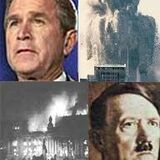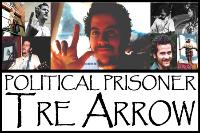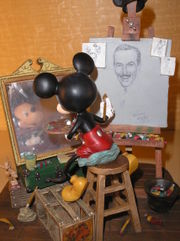Sunday, December 30
Fogging Federal Transparency: "Secrecy Central" at Dickie C's Big House
Question: Which U.S. President said "Secrecy and a free, democratic government don't mix."? (Hint: It wasn't either Poppy Bush nor his evil spawn.)
Answer: President Harry S. Truman
On his Oval Office desk, Truman kept a plaque that read "The Buck Stops Here," although the 33rd US president was notably mum about his service as an upstart Missouri politico when all the Kansas City mafia big bucks (and here) stopped in his campaign coffers.
Truman, however, publicly rued that his presidency spawned in 1947 the predecessor to what today is the hyper-secret, free-agent rouge Central Intelligence Agency. A Democrat, Truman wanted but could not prevent the CIA from circumventing his attempt to get the Agency on a short oversight leash to be accomplished through his then newly-created National Security Council; Agency oversight in theory was coordinated by both Secretaries of State and Defense.
But as Truman's was ending in 1952, the Agency was well established in planning and executing assassinations and "passive" coups of free governments around the world, actions rubber-stamped by Agency confederates secreted onto the NSC to hide such "executive actions" from the view of Truman and his Secretary of State Dean Achechon. Then after GOP presidential candidate Dwight Eisenhower's January 1953 inauguration, the NSC-CIA nexus completely morphed from Truman's intended advisory panel fascasde into its own policy-setting council.
The secret "black ops" genie was now out of an unstoppered bottle, and America's fascist "Secret Team" (1)--ranking government officials, cells of key U.S. corporations, and foreign allies--roamed without official oversight, perfectly epitomized since 9/11 by the Cheney-Bush White House.
Post 9/11 Update: White House Secrecy Rules
I do vaguely recall something about public access to government records as a basic ingredient for democratic governance.
The Bush-Cheney ticket, however, prefers maximum secrecy. No; amend that to read a "fetish" for top secrecy. A month after 9/11, World Socialist Website (WSWS) staff writer Patrick Martin presciently noted bipartisan complicity in fogging over government transparency.
The month since the terrorist attacks in New York City and Washington has seen dramatic changes in the day-to-day functioning of the US government and the open emergence of powerful tendencies toward antidemocratic and dictatorial methods of rule.
The Bush administration has sought to impose greater secrecy than that which prevailed during World War II, pressured the media to censor coverage of opponents and targets of the war drive in Central Asia, and engaged in arbitrary arrests and detentions without trial on a scale not seen in America for more than 80 years.
The Democratic Party has been a willing partner in this onslaught on democratic rights. Last week the House Judiciary Committee voted 36-0 [to include John Conyers vote] for a package of repressive measures sought by the Bush administration in the name of combating terrorism. The Senate approved a similar bill by 96-1 [thank God for Wisconsin Democrat Russ Feingold] on October 11, and final passage by both houses is expected in the coming week.--WSWS, 13 October 2001
 A month after Martin's observation, AP writer Deb Riechmann then underscored the arbitrary nature of the post-9/11 secrecy with the following passage on George II's new Executive Order limiting access to presidential papers:
A month after Martin's observation, AP writer Deb Riechmann then underscored the arbitrary nature of the post-9/11 secrecy with the following passage on George II's new Executive Order limiting access to presidential papers:One historian calls it a "disaster for history,'' but the White House insists a new executive order issued by President Bush balances the public's right to see the records of past presidents with a need to protect national security.Much that has appeared in the mainstream press and blogosphere since the months after 9/11--and throughout 2002--rehashes the theme of diminishing government transparency while omitting the operative term "fascism."
Advocates for the release of government documents say the executive order violates the spirit of the 1978 Presidential Records Act and will usher in a new era of secrecy for papers left behind by America's chief executives.
The White House says the order simply sets up a procedure for implementing the act and gives former presidents more authority to claim executive privilege to withhold certain papers. Absent ``compelling'' circumstances, the incumbent president will agree with a former president's decision to disclose or withhold documents, the White House says.
Nonetheless, consider the following 2003-2004 highlight reel of Bush/Cheney successes at stifling the American public's right to know how tax dollars are spent ever since the the evil pair stole their way into the White House in January 2001.
The Bush administration has put a much tighter lid than recent presidents on government proceedings and the public release of information, exhibiting a penchant for secrecy that has been striking to historians, legal experts and lawmakers of both parties.Dickie C Wants His Papers Hidden, Too
Some of the Bush policies, like closing previously public court proceedings, were prompted by the Sept. 11 terrorist attacks and are part of the administration's drive for greater domestic security. Others, like Vice President Dick Cheney's battle to keep records of his energy task force secret, reflect an administration that arrived in Washington determined to strengthen the authority of the executive branch, senior administration officials say....--New York Times, 3 January 2003
Among the abuses U.S. News points out is the denial of information to a former U.S. Army Ranger who wanted information about a planned high-volume natural gas pipeline through the center of his community. To help organize citizens, he sought information about the project from the federal government, which denied the request. Although it was previously public, the Federal Energy Regulatory Commission claimed that disclosing the route could make the line a target for terrorists. But as the former Ranger pointed out, once construction began, the route of the line would be common knowledge anyway.--Buffalo News, January 2003 (quoted here)
Americans seeking to know what President Bush said in his phone conversation with Russian President Vladimir Putin earlier this month went to the obvious place: the Kremlin. It may come as a surprise to some that the Kremlin, symbol of secrecy and repression, has become more transparent than the White House, symbol of freedom and democracy... Agence France-Presse White House correspondent Olivier Know has proposed a slogan for the Bush team: "When we have something to announce, another country will announce it."--Washington Post, 20 April 2004
The White House said on Tuesday it would not allow any recordings or transcripts of private testimony this week by President Bush and Vice President Dick Cheney to the panel investigating the Sept. 11 attacks.
Rebuffing demands from families of some of the nearly 3,000 dead and other critics of the administration for public testimony, Bush and Cheney only agreed to Thursday's unprecedented interview under pressure and on the grounds they would appear together and behind closed doors.--Reuters, 27 April 2004
The classification of the Taguba Report [on US torture at Iraq's Abu Ghraib prison] "may have violated official secrecy policies, which prohibit the use of classification to conceal illegal activities."--Federation of American Scientists, Project on Government Secrecy, 5 May 2004
A November 2004 report authored by Congressman Henry A. Waxman accused the Bush administration of a "systematic effort - to limit the application of the laws that promote open government and accountability," adding it has "sought to curtail public access to information while expanding the powers of government to operate in secret."
Authored by Congressman Henry Waxman, a California Democrat and one of the administration's most vocal critics on the subject of secrecy, the comprehensive report alleges that both U.S. citizens and Congress are being denied access to millions of pages of documents to which they are entitled under law.--Inter Press Service Service, November 2004
Not to be outdone by Bush Boy, this summer VP Dick Cheney moved to exempt his papers from public scrutiny. On 26 December, ThinkProgress updated that ongoing development.
In June, House investigators revealed that Vice President Dick Cheney had exempted his office from an executive order designed to safeguard classified national security information. He claimed that the Office of the Vice President (OVP) is not an “entity within the executive branch.”As former neo-conic icon Paul Craig Roberts--a former "Assistant Secretary of the Treasury in the Reagan administration,...Associate Editor of the Wall Street Journal editorial page and Contributing Editor of National Review"--noted in a post-Christmas essay, it's but a matter of time before Dick, George and their brownshirt boys ensure some of us more "unruly" Americans are safely locked away with their hidden papers.The National Security Archives’ Information Security Oversight Office (ISOO) wrote Cheney’s then-chief of staff David Addington on two separate occasions in summer 2006, disputing those claims. Cheney’s office ignored both letters. Finally, in Jan. 2007, the ISOO directly asked — to no avail — Attorney General Alberto Gonzales to resolve whether the executive order applies to Cheney’s office.
In a new interview with Newsweek, ISOO director J. William Leonard — described as the “gold standard of information specialists in the federal government” — said that he is quitting after 34 years, partly because of pressure from Cheney’s office. Addington personally tried to “wipe out” his job after Leonard attempted to challenge Cheney’s claims. From the interview:
LEONARD: So I wrote my letter to the Attorney General [asking for a ruling that Cheney’s office had to comply.] Then it was shortly after that there were [email] recommendations [from OVP to a National Security Council task force] to change the executive order that would effectively abolish [my] office.
Who wrote the emails?
LEONARD: It was David Addington.No explanation was offered?
LEONARD: No. It was strike this, strike that. Anyplace you saw the words, “the director of ISOO” or “ISOO” it was struck.Leonard also reveals that much of the information Cheney’s office was classifying wasn’t actually “real secrets,” underscoring the need for independent oversight. Some of the materials, for example, contained politically damaging information related to the Valerie Plame leak case:
A number of prosecution exhibits [in the Plame-related perjury trial of I. Scooter Libby, Cheney’s former chief of staff] were annotated, ‘handle as SCI.’ SCI is Sensitive Compartmentalized Information, the most sensitive classified information there is. As I recall, [one of them] was [the vice president and his staff] were coming back from Norfolk where they had attended a ship commissioning and they were conferring on the plane about coming up with a [media] response plan [to the allegations of Plame’s husband, Iraq war critic Joseph Wilson.] That was one of the exhibits marked, ‘handle as SCI.’
Cheney’s office refused to directly respond to Newsweek’s piece.
Resources:
OpenTheGovernment.org ("Americans for Less Secrecy, More Democracy")
Public Citizen's BushSecrecy.org
In October 2007, Bernan book publishers of Lanham, MA., released the hardback edition of a new book by Patrice McDermott, Ph.D., director of OpentheGovernment.org. Titled Who Needs to Know? The State of Public Access to Government Information, the table of contents is available in pdf file format here; read a sample of the book here.
===
1. From 1955 to 1964, Colonel LeRoy Fletcher Prouty (www.prouty.org) served--according to the 1997 preface of his book The Secret Team: The CIA and Its Allies in Control of the United States and the World--as "the first Chief of Special Operations with the U.S. Joint Chiefs of Staff. All of these duties, during those Pentagon years, were structured to provide 'the military support of the world-wide clandestine activities of the CIA'. They were performed in accordance with the provisions of an Eisenhower era, National Security Council Directive No. 5412/2, March 15, 1954."
Prouty's immensely under-appreciated book, in part offering a keening insightful evolutionary history of CIA organizational structure, remains online in its entirety here.











